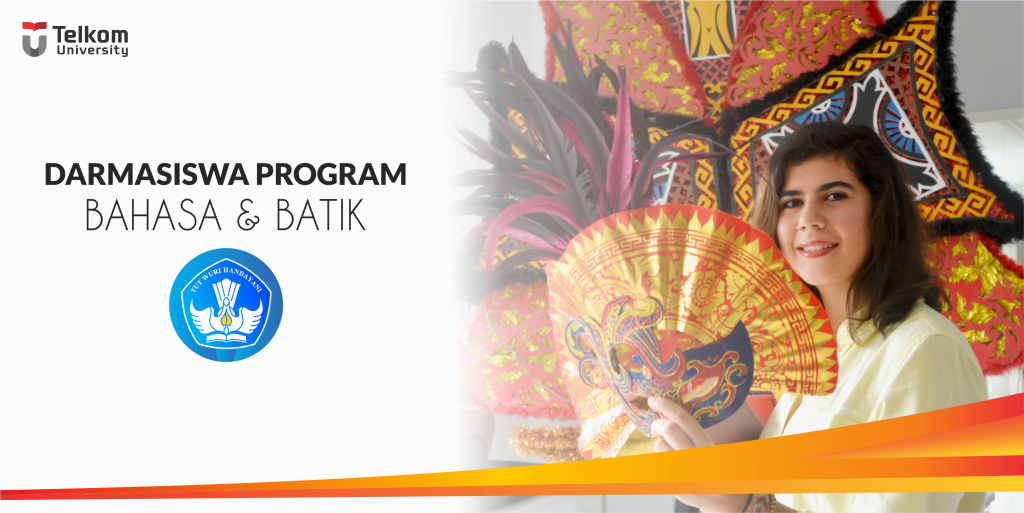Telkom University Darmasiswa Program
Darmasiswa is a scholarship program offered to all foreign students from countries which have diplomatic relationship with Indonesia to study Indonesian language (Bahasa Indonesia), art and culture in 54 universities in 2015. This program was established in 1974 as part of ASEAN initiative, admitting only students from ASEAN. However, in 1976 this program was extended further to other countries. Up to date, the number of countries participating in this program is more than 111 countries and organized by the Ministry of Education and Culture (MoEC), The Republic of Indonesia.
The main purpose of Darmasiswa program is to promote and increase the interest in the language, art, and culture of Indonesia among the youth of other countries. It has also been designed to provide stronger cultural links and understanding among participating countries.
Telkom University has been entrusted by Ministry of Education and Culture (MoEC), The Republic of Indonesia to incorporate in Darmasiswa program and start to receive Darmasiswa students since 2012. Telkom University has adjusted to Darmasiswa program academic year 2017/2018 with emphasis on Indonesian language program and provide textile enrichment based on Indonesian culture.
Through this program, students are expected to adept Indonesian language on the first semester, and on the second semester, they expected to be able to perform formal presentation by using the Indonesian language.
Curriculum
Telkom University Darmasiswa Program Curriculum
| Semester | Subject | Academic Composition |
| I | Indonesian Language | 100% |
| II | Indonesian Language | 60% |
| Batik | 20% | |
| Culture | 20% |
BIPA Class
Telkom University Darmasiswa Program BIPA Class
The main purpose of this class is to make students appreciate, honor, understand, and adapt also applying Indonesian language skill such as listening, reading, and speaking and enjoy Indonesian culture, literature, and handicraft. Telkom University offers two different class which are formal class and direct application.
Formal Class
Formal classroom courses designed for learning Indonesian for Foreign Speakers is illustrated in the following table
| Semester | Subject | Description |
| I | Indonesian Language | Learning held in the classroom by focusing on the skills of listening, reading, writing, and speaking. |
| II | Indonesian Language | Learning held in the classroom by focusing on the skills of listening, reading, writing, and speaking. |
| Culture | Learning held in the classroom with a focus on learning Indonesian culture, especially the culture of West Java. | |
| Batik | Learn the knowledge, techniques, and skills in the scope of Indonesian Batik. |
Direct Application
In addition to language classes and cultural formal, BIPA program also includes direct application in everyday life that aims to make the participants BIPA can directly practice all form of theory which has learned in a formal classroom.
| Semester | Subject | Description |
| I & II | Indonesian Language | Learning held in the classroom by focusing on the skills of listening, reading, writing, and speaking. |
| Indonesian Language | Learning held in the classroom by focusing on the skills of listening, reading, writing, and speaking. | |
| Culture | Learning held in the classroom with a focus on learning Indonesian culture, especially the culture of West Java. |
In the end of this program, BIPA participants will be evaluated by following Uji Kemahiran Berbahasa Indonesia (UKBI). It is a Proficiency test to measure language skill when communicate using the Indonesian Language, both speakers of Indonesian and foreign speakers. Proficiency test was initiated by the Ministry of Education and Culture (MoEC), The Republic of Indonesia.
Batik Class
Textile and Fashion Craft courses are given in the Faculty of Creative Industries, which Darmasiswa participants will learn the knowledge, techniques, and skills in the scope of Indonesian Batik. In addition to lectures, the participants were given insights into the craft and textiles produced by the artists in Indonesia so that they can better understand the material that will be given. The participants will attend lectures Darmasiswa regular with Indonesian introduction along with other University students.
| Subject | Description |
| Introduction to Indonesian Textile | Learns the history and process of making traditional Indonesian textiles and current development. |
| Tie Dye | Practicing manipulation of fabric with tie-dye techniques, which include learning about the history, theory, and techniques, until its application on fashion products. |
| Batik Technique and Application | Practicing manipulation batik fabrics include learning about the history, theory, and techniques until its application on fashion products. |
| Marbling Technique and Application | Practicing fabric manipulation techniques with the use of starch and dyes to produce abstract textures on textile surfaces such as canvas. |
| Motif Design for Textile | Practicing mastery of basic ability to design a structured and measurable through manual techniques that applied to simple fashion products. |
| Silk Painting Technique and Application | Practicing manipulation on the surface of the fabric with the technique of painting on silk fabric surface as well as other supporting manipulation techniques. |
| Tapestry | Practicing the techniques of tapestry to operate and utilize the tools to produce Tapestry and be able to apply design principles in the design process. |
| Indonesian Culture and Costumes | Learn the culture and norms of everyday society in Indonesia, including how to dress, social, and cultural differences in the face every day.
|
| Soft Jewelry Technique & Application | Practicing fabric manipulation techniques with the use of starch and dyes to produce abstract textures on textile surfaces such as canvas |
| Weaving | Weaving technique practiced by operating and utilizing the tools to produce such inkle weaving loom and are able to apply design principles in the design process. |
| Kebaya Design | Studying a variety of designs, both traditional and modern kebaya, the manufacturing technique and materials used and shape it in the form of kebaya design appropriate personal size. |
Final Project
Students are directed to produce work based on the knowledge and insights have been taught so that at the end of the semester the coursework can be exhibited. At the end of the program, the Daarmasiswa jointly offer the exhibition of works by inspiration from the local culture of Indonesia.
Registration
Register for Telkom University Darmasiswa Program

